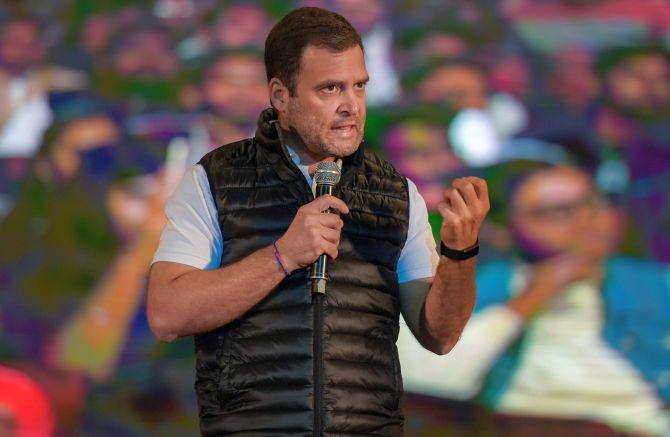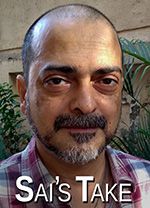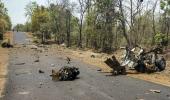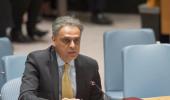'Rahul Gandhi has shown that he can field questions on the fly -- something the frontrunner in this election has failed to do in the last five years -- but does it mean he can survive another bout with a primed-up ArGo?' asks Saisuresh Sivaswamy.

Interviews, genuine interviews -- not scripted ones with predetermined questions and answers that we have become all too familiar with in this election season -- sometimes don't go the way they are expected to.
The interviewer approaches it with one set of expectations -- usually hoping to be counted as the definitive interview -- while the interviewee approaches with a different set of expectations -- ranging from saying what s/he wants to get across, to giving a good account of oneself when faced with uncomfortable questions.
The problem for the interviewer is when he has not done his homework and doesn't ask the questions that need to be asked, instead focusing on aam questions, while for the interviewee it is when he doesn't come prepared with the answers, and doesn't expect bouncers in the Q&A but gentle medium pace that allows him to smack the ball to the boundary.
Rahul Gandhi's January 2014 interview to Arnab Goswami then of Times Now went wrong on so many counts, but primarily because he did not have answers on the fly, did not know how to return fire with fire.
The written word glosses over many things, but the all-seeing camera doesn't spare anything, or anyone.
It would be unfair to Rahul Gandhi -- and exaggerating the importance of the interview -- to lay the blame for the Congress's miserable electoral performance in 2014 at Arnab Goswami's door, but Priya Dutt, the candidate from Mumbai North-Central did tell Rediff.com soon after that he should not have done the interview for the damage it caused.
The damage was to Rahul Gandhi's brand; the Pappu memes further drove the knife in deeper, and it took him a while to crawl out of that hole.
Yes, adverse interviews can do that, and it takes a very special kind of skill, strength to claw back.
Has Rahul Gandhi done that? Will he be able to go for another round with the all-powerful TV anchor who in his new workplace makes no bones about his 'India First' journalism that damns one and deifies the other?
We got a taste of it from the Congress president's interview to NDTV's Sreenivasan Jain on Thursday, that had already been aired in the day before being billed for prime time viewing.
The Rahul Gandhi of 2019 is a far cry from the one of 2014, that much even his worst detractors in the BJP headquarters cannot deny.
'Where do you guys get your analysis from?' Rahul Gandhi shot back at Jain before going on to declare that Narendra Damodardas Modi will not be back as prime minister in this election, 'guaranteed'.
This is a line that the Congress leadership has decided to adopt in the last lap, questioning the prime minister's winnability, an old battle tactic that seeks to undermine the enemy ranks by sowing uncertainty in their minds.
This contention Rahul bases on an 'upsurge' among the people against the government which he has been sensing in his travels across the country and in his rallies, but one needs to remember that the crowds that throng political leaders are often partisan which are brought to the venue, and seldom spontaneous.
It is interesting that while the Congress president talks of an 'upsurge' against the government, the BJP is talking of a 'silent wave' among the electorate.
But the most outlandish statement coming from the Gandhis -- both brother and sister have made the same point, obviously in sync -- is that their weak candidates in Uttar Pradesh will actually help the Samajwadi Party and Bahujan Samaj Party gathbandan by cutting into the votes of the BJP -- an announcement that had TV's hashtag warriors float #VoteCutterCongress.
Rahul repeated this point made earlier by Priyanka, saying the 'secular formation is winning in UP' and that 'gathbandan and Congress will clean up UP', but failed to come across as convincing on the Congress's ability to stand on its own in the state.
The party's strengths, he said, were that 'Wwe listen to the people, have an open mind,' while its weakness was being 'very disorganised'.
Overall, Rahul Gandhi has shown that he can field questions on the fly -- something the frontrunner in this election has failed to do in the last five years -- but does it mean he can survive another bout with a primed-up ArGo?

The Nation Wants To Know!
One of the rules of TV interviews is to not say something that you cannot defend. Granted, it may all be too tempting, one can get carried away by the spell cast by the camera and momentarily lose control of one's tongue, but the trick is always the same. Take a deep breath, count to 10...
On Thursday night it was the turn of the BJP's G V L Narasimha Rao to fall prey to verbal incontinence. The topic of discussion was former prime minister Manmohan Singh's claim of the UPA government having conducted six surgical strikes but not using it for electoral purposes.
As the BJP spokesperson, Rao was naturally apoplectic over any claim that has the potential to rain on the BJP's parade, at a time when the ruling party was billing itself as the only government with spine since Independence.
'Where did they do the surgical strikes, in 24 Akbar Road?' he asked dismissively, referring to the Congress party headquarters, and Rajdeep Sardesai was quick to pounce on it.
'Are you then saying that Dr Manmohan Singh is lying?', a question that brought Rao back to Earth.
At an obvious loss for answer, he waffled on, but his bluff had been called.
Transposing what Rahul Gandhi told Sreenivasan Jain, about his own data showing that around 70 per cent of the people are now convinced that there was something wrong in the Rafale deal, and the discussion on NDTV 24x7 if 2019 was a national security election, the question is not whether the latter tag is correct -- Masood Azhar or no, this was always meant to be an election on national security -- but whether the Congress had all along been barking up the wrong tree with its president singling out the Rafale while the nation wanted to hear something else.
The UN security council's blacklisting of Azhar bang in the middle of electioneering, and the political mileage the BJP -- or any other party -- will extract from it has obviously led to a recalibration of strategy, whereby a reticent prime minister who did not talk about the six surgical strikes undertaken by his government when they happened, has been pushed forward to dent the BJP's claims to defending national security at all cost.
Is it too little, too late?











 © 2025
© 2025